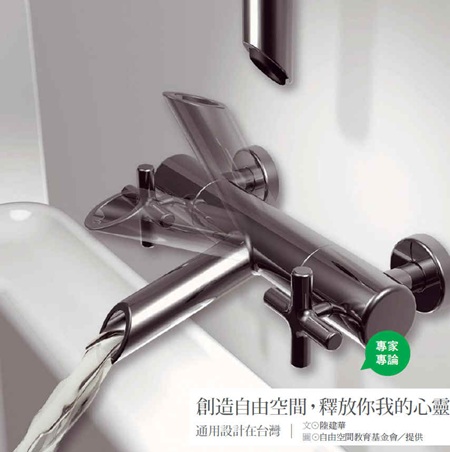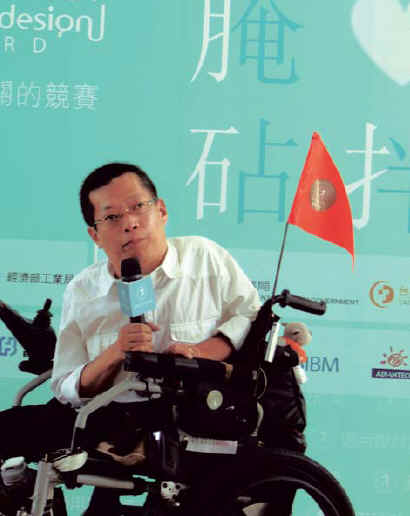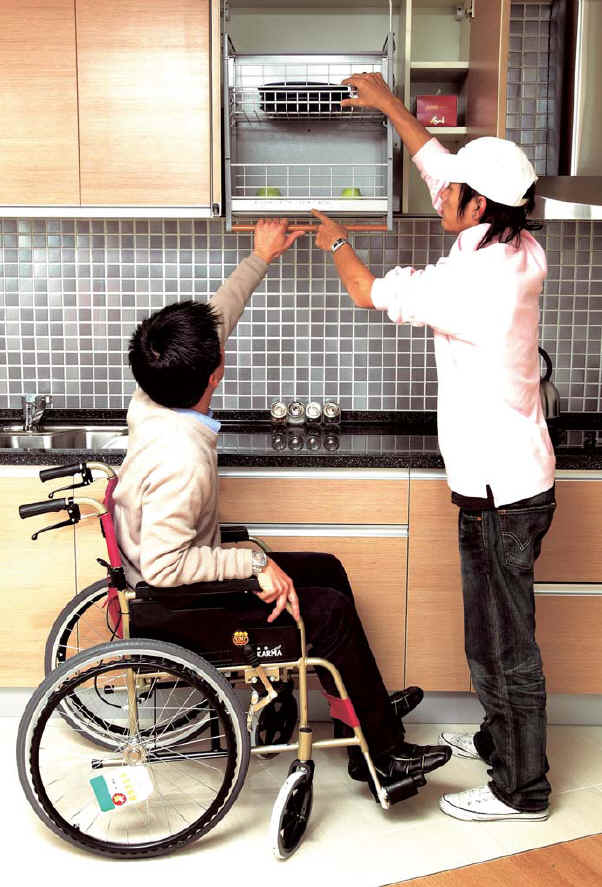
A great city has many legends, stories of unforgettable people that are shared from generation to generation. A hundred years from now, I hope that our city is not just known for one of the world’s tallest buildings, but rather for being a land where people can fulfill their dreams.
In the 1980s, Tang Feng-chen came to Taipei all alone in his wheelchair from his hometown in Chiayi. He looked all over to find a place to live, but had a very hard time. It wasn’t the landlords that rejected him, but the living spaces, which were full of barriers. He looked at over 20 apartments before he found one that was fairly livable.Now in the 21st century, Tang is coordinating the efforts of the government, corporations and academics, as well as Taiwan’s creative industries, to make Taiwan a more livable place. In 2004, Tang established the Free Universe Education Foundation, to open a new door for designers to use their creativity. 
Universal Design is progressive
Universal Design is very progressive in that it strives to not only accommodate the needs of the physically challenged. It also enables the elderly, children, wounded, pregnant, parents and even those facing special challenges (like moving heavy objects) to enjoy more pleasant and user-friendly environments.
Public restrooms are an example: there are few restrooms with sinks that can be used comfortably by people of different heights. Many parents have to lift up their children so they can wash their hands. Whether you’re at a restaurant or any public place, it’s not easy to find a bathroom where children can safely and easily wash their own hands. That’s because the sinks were designed with the average height of an adult in mind, rather than a universal design.
Design that makes us smile
Universal Design enables people who usually face barriers in their lives to have the freedom to be themselves and pursue their passions and dreams. As of February 2009, Taiwan’s elderly population has already exceeded 2,410,000, 10.74% of the total population (according to the Ministry of the Interior). That means for every ten persons, there is one elderly, and by 2026, every 3.3 persons will need to support one elderly. If you add to that population the wounded, pregnant, children, and others with special needs, there are many people in Taiwan who need products designed with their needs in mind. If designers only have young healthy adults in mind, what about the vast needs of our aging society? Looking at this from another perspective, companies can see these growing needs as a great business opportunity to create products for these important people in our society.
The concept behind Universal Design is that if you design products with the needs of many people in mind, you won’t have to modify the products. Japanese designer Nakagawa Satoshi describes universal design as “design that makes the user smile”. Others have defined it as “a consciousness that creates user-friendly products and environments” (Nakagawa Satoshi’s Universal Design Textbook).
In the 1990s, North Carolina University Professor Ronald L. Mace, a physically-challenged architect, led a research group to help promote the idea of universal design. At the same time, the US Congress passed the American with Disabilities Act which helped Americans promote the Universal Design concept. Universal Design is being used as a professional tool and way to solve problems and meet social needs.
Universal Design in Taiwan
Many academics in Taiwan are teaching the concept of Universal Design including National Yunlin University of Science and Technology Professor C.F. Lee , Tunghai University Professor Chen Ming-shih, National Taiwan University of Science and Technology Professor Huang Zhi-jia, Tainan University of Technology Professor Ting Chih Chiang. Architecture and interior design classes also are beginning to teach barrier-free design. There are also laws that govern the creation of barrier-free spaces. So Taiwan has already begun developing a barrier-free environment. Now we need to carry the universal design concept to the design of the overall city, buildings and products.
The Free Universe Education Foundation was established in 2004. That year Taiwan’s Creativity Lab also established a universal design lab and invited Japanese designer Nakagawa Satoshi to visit. After meeting with Satoshi, Tang set the future direction of his foundation’s work. The first theme for the universal design contest was food. Taiwan’s winning designs also participated in Japan’s design exhibition and panel discussions. Their products also became commercialized in Taiwan and the contest has since been held annually. Tang also went to 55 colleges and universities in Taiwan to promote the universal design concept to design students. Every year, the number of people entering the contest increases (1st year: 643, 2nd year 768, 3rd year 950). Many students have participated and universal design has become a concept every new designer most understand.
The 4th Universal Design contest began on May 7, 2009. With the efforts of Tang and his foundation, Universal Design is becoming more well known among Taiwan’s academics and government officials. The Ministry of Interior Architecture and Building Research Institute has supported all four contests and has set universal living space as an important research topic. The Taipei City Government’s Department of Urban Development and the Ministry of Economic Affairs Industrial Development Bureau have also begun to promote Universal Design. Corporations such as Fubon Financial, Fubon Construction, Taiwan High-speed Rail Corporation and Taiwan Mobile are also a part of the universal design movement.
Universal Design began in Taiwan with academic research, but with the involvement of Taiwan’s creative industry professionals, and the inspiration of Nakagawa Satoshi and the Free Universe Education Foundation, industry, government and academics are now working together to help Universal Design take root and grow in Taiwan.
The future of Universal Design
The Free Universe Education Foundation plans to promote Universal Design in four ways: 1) Universal Design contests and the commercialization of the winning products 2) promote research and development of universal design concepts through workshops and cooperation between academic and corporations 3) create a Universal Design certification system 4) create Universal Design overseas study and research scholarships.
Tang summarizes the efficiency of Universal Design, “When you do it right the first time, you don’t have to spend money to change it, these designs will last ten, one hundred years.” A hundred years from now, our grandchildren will know that this land is home to one of the world’s tallest buildings. We hope that it will also be one of the world’s most convenient, safe and comfortable places to live.
The above article was written by architect Jeff Lu, the Creative Director at Paradise Design and a consultant for Free Universe Education Foundation.
The Seven Principles of Universal Design
- Equitable Use: The design does not disadvantage or stigmatize any group of users.
- Flexibility in Use: The design accommodates a wide range of individual preferences and abilities.
- Simple, Intuitive Use: Use of the design is easy to understand, regardless of the user’s experience, knowledge, language skills, or current concentration level.
- Perceptible Information: The design communicates necessary information effectively to the user, regardless of ambient conditions or the user’s sensory abilities.
- Tolerance for Error: The design minimizes hazards and the adverse consequences of accidental or unintended actions.
- Low Physical Effort: The design can be used efficiently and comfortably, and with a minimum of fatigue.
- Size and Space for Approach & Use: Appropriate size and space is provided for approach, reach, manipulation, and use, regardless of the user’s body size, posture, or mobility.
Source: The Center for Universal Design
If you’d like to learn more about Universal Design, visit the links below:
CleocinGel Flonase
























